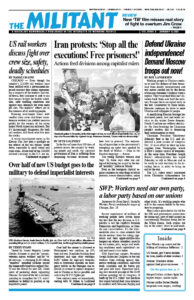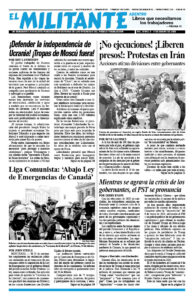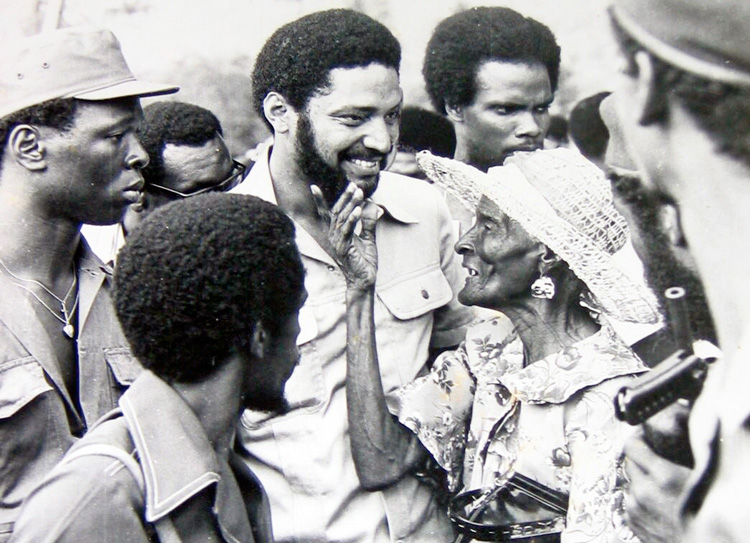To mark the anniversary of the Jan. 1, 1959, popular triumph in Cuba, the first of Pathfinder’s Books of the Month for January is Fidel Castro: Nothing Can Stop the Course of History. It is a wide-ranging interview by Jeffrey M. Elliot and Mervyn M. Dymally with the central leader of Cuba’s socialist revolution. These excerpts cover Maurice Bishop and the 1979-83 Grenadian Revolution. The workers and peasants government led by Bishop on this small, largely Black, English-speaking Caribbean island was a powerful reinforcement for the Cuban Revolution. In October 1983, Bishop and others were murdered in a Stalinist coup led by Bernard Coard, overthrowing the revolutionary government. This paved the way for a U.S. military invasion the following week. Copyright © 1986. Reprinted by permission of Pathfinder Press.
In effect, what was taking place in Grenada was not a socialist revolution, but a process of social changes. I believe that the basic factor that opened the door — that served the United States a pretext on a silver platter for invading that country, at a lower political price — were the activities of an ambitious and extremist sectarian group. In my view, the main responsibility for the domestic situation created there lies with [Bernard] Coard. An alleged theoretician of the revolution who had been a professor of Marxism in Jamaica, he profited from his reputation as a theoretically well-prepared man and used his reputation as a theoretician to promote his personal ambitions and conspire against Bishop. …
I think personal ambition was Coard’s basic motivation and what really confused many people in whom he inculcated extremist ideas from supposedly revolutionary positions, as a means of gaining support. In the name of the purity of Marxist-Leninist principles, he portrayed Bishop as a man insufficiently prepared to lead the country. Very subtly, he did it very subtly. He worked in the rank and file of the party, the armed forces, the Ministry of the Interior — always presenting himself as an apostle of the purity of ideas — and astutely, little by little, he created the image of a vacillating, reformist Bishop. Thus, he confused many people of good faith in the revolutionary ranks.
Bishop had great popular support and was well liked by the population. But Coard and his group — who belonged to one of the organizations that joined with Bishop to form the New Jewel Movement — didn’t work with the masses. That is, the Coard group didn’t work with the masses; it worked among the party members — who were a small group of about 200 — and with the cadres of the army and the Ministry of the Interior. This fifth column, this undermining of Bishop’s authority, coalesced at a moment when Bishop — though he had the support of the immense majority of the people — lost the majority within the party, both in the Central Committee and among the membership. This was the fruit of the conspiracy led by Coard and his group. It explains the senseless and mad step of arresting Bishop and, even worse, of firing upon the people and assassinating Bishop. It was that unfortunate event that made it possible for the Reagan administration to perpetrate the cynical and opportunistic invasion of the country.
If Bishop had been alive leading the people, it would have been very difficult for the United States to orchestrate the political aspects of its intervention. … In short, Coard and his group served the United States, on a silver platter, ideal conditions for the invasion of Grenada.
Naturally, they were not going to be met with the people’s resistance, for the simple reason that the people were outraged, traumatized by the attitude of this group that had fired upon the people and assassinated Bishop. Thus, a divorce took place; those involved in the coup gathered the weapons of the militia. They disarmed the militia on various pretexts, precisely for fear of the people after what they had done. …
[T]he United States had no right whatsoever to invade and occupy Grenada; the U.S. had no right to do it. …
It invaded Grenada to eradicate the revolution and to reestablish the former regime in that country. That’s all.
One more thing: the United States invades a country and violates all international laws to do away with a process that was dead. Why? Because I’m totally convinced that Coard and his group committed political suicide. After they assassinated Bishop and fired upon the people, that process could not endure. I believe that it was the people — the people themselves, the Grenadians themselves — who had to solve that problem, and they were going to solve it.
The government could not have endured. We wouldn’t have offered any support to that government after it murdered Bishop and fired on the people. After we had assumed that attitude, it would have been difficult for any other socialist or progressive country to support that group, because Bishop actually had great authority and great international prestige. He had attended numerous meetings of the Commonwealth, the Movement of Nonaligned Countries, and the United Nations. The whole world thought highly of Bishop; that Pol Pot-type group that murdered him would never have been forgiven. …
[W]hen the people’s uprising occurred, they became so frightened and confused that they fired upon the people and shortly thereafter killed Bishop and a group of valuable aides. That is the historical truth.
We fully endorsed Bishop’s policies, because they were realistic. They weren’t extremist policies. They were based upon the country’s situation and its level of development, and they were working for the people’s well-being, for Grenada’s development. …
Bishop had a program, but not a socialist program — nor could he have had a socialist program. Rather, it was a program for social justice and for the country’s development. Bishop implemented an agrarian reform, but he didn’t nationalize the hotels. A country that lived on tourism, did not even have its own currency, and had no industries, could not rush headlong into drastic social changes. Bishop was implementing a rational, intelligent program and was really making progress.


